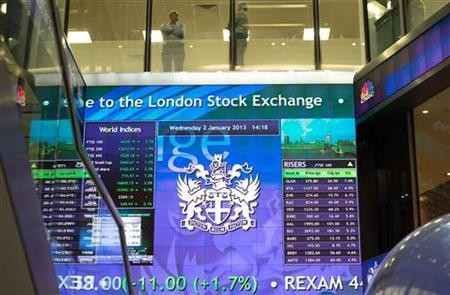European Shares Retreat Amid Weak Economic Data

European shares posted modest declines Tuesday amid increasing concern for the health of its major economies as investors awaited the traditional start of the US corporate earnings season.
Britain's benchmark FTSE 100 fell by 10.95 points, or 0.2 percent, to close at 6,053.63 while Germany's DAX index slipped 36.83 points, or 0.48 percent, to 7,695.83. The region's broadest measure of blue-chip share price performance, the FTSE Eurofirst 300, declined 1.37 points to 1,160.2.
Anglo American shares were the day's biggest gainer in the UK, rising 2.55 percent following news that it named former AngloGold Ashanti CEO Mark Cutifani to replace the outgoing Cynthia at the world's largest platinum producer. Vodafone was another significant mover, rising 2.5 percent following an unconfirmed report in the Wall Street Journal that the world's largest mobile phone company could be close to agreeing the sale of its 45 percent stake in US carrier Verizon Wireless.
US stocks also closed lower on the session, with the Dow Jones Industrial Average slipping 56.29 points, or 0.42 percent, to close at 13,3328. The S&P 500 fell 4.84 points to 1,457.05 and the Nasdaq gave back 6.87 points, or 0.22 percent, to close at 3,091.94.
Alcoa posted fourth quarter profit figures after the close of business in New York that were largely in-line with analysts' estimates. The world's largest aluminium producer continued its tradition of kicking off the US corporate earnings season with a 1.5 percent fall in revenues to $5.89bn and earnings per share of $0.06. Alcoa shares rose 1.2 percent in after-hours trading following the results.
Overall, Wall Street is looking for US companies to posted a collective 2.9 percent increase in quarterly profits, according to Bloomberg data.
Economic data dominated the news flow across Europe, led by a record reading of unemployment around the single currency area for the month of November. More than 18.2m people - 3.73m of them under the age of 25 - are actively seeking work around the seventeen-member Eurozone, the region's statistic agency Eurostat reported, taking the headline jobless rate to a record 11.8 percent.
Youth unemployment around the region was a record 24.4 percent and reached as high as 56.5 percent in recession ravaged Spain.
In Germany, Europe's largest economy, the jobless rate was a muted 5.4 percent, but investors were troubled by two key points from its critical manufacturing sector. Germany's powerful export sector suffered a deeper-than-expected 3.4 percent in November. Imports sagged 3.7 percent, the country's Federal Statistics office said, narrowing its trade surplus to €14.6bn.
Manufacturing orders, perhaps unsurprisingly, slowed in the month as well, particularly those from overseas, the Economy Ministry reported. The overall 1.8 percent slump was measured against a downwardly-revised 3.8 percent gain in October.
Retail sales around the region were also disappointing, rising a modest 0.1 percent on the month, according to Eurostat, but still a worrying 2.6 percent down from the same period last year.
The one bright spot came from the European Commission's reading of economic sentiment, which rose to 87 in the month of December from 85.7 in the previous month.
Economists from Societe Generale suggest the data points to a 0.3 percent contraction for the broader Eurozone economy but it did give rise to some optimism that the world's second-largest economic bloc could claw its way out of recession in the second half of this year.
In the UK, the country's main business lobby group, the British Chamber of Commerce, predicted a "modest" recovery for Europe's second-largest economy in 2013 in its latest quarterly economic survey while the British Retail Consortium said that like-for-like sales across the country in December rose a modest 0.3 percent last month, with the lobby group describing the Christmas sales season as "underwhelming" owing to muted consumer confidence and an overall lack of optimism from British shoppers.
Online sales, however, remained the bright spot for UK retailers, rising 20 percent last month, the BRC said, from an annual monthly average of around 12 percent.
Sterling pulled back from a 16 month high to trade 0.1 percent lower against the US dollar at $1.6094. It also slipped around 0.2 percent against the euro at 1.3073. Benchmark 10-year Gilt yields continued to fall, trading 5 basis points lower on the session to around 2.04 percent, around 54 basis points higher than 10 year Bunds.
Elsewhere Gold gained around 0.3 percent during European trading hours to trade at $1,650 an ounce.
© Copyright IBTimes 2025. All rights reserved.





















